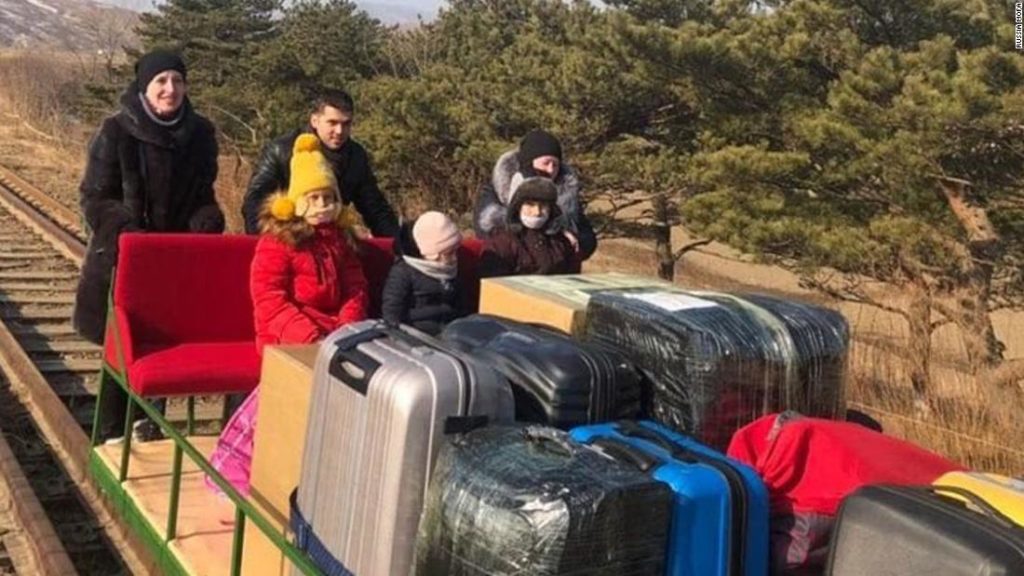The labyrinthine journey was the only way the Russian diplomats and their families could leave the country, the Russian Embassy said on its verified Facebook page.
A trolley, also known as a handcart, is a type of railroad car popularized in the 1800s that is powered by its passengers through the use of a pump action lever, or by people manually pushing the car from behind.
The Embassy posted two pictures of third secretary Vladislav Sorokin pushing his family and their luggage along the rail tracks while wearing thick winter clothing. The youngest of the crew was Sorokin’s 3-year-old daughter Varya.
Sorokin had to push the handcart for a kilometer (0.6 miles), part of which included a bridge over the Tumen River that separates Russia from North Korea.
Once the family reached the Russian station of Khasan, they were met by colleagues in the Ministry of Foreign Affairs who helped them get to the airport in Vladivostok.
Further isolation
The departure of the Sorokin family and other Russian diplomats means that Pyongyang’s already small expatriate community, a valuable source of information on one of the world’s most reclusive and secretive countries, is shrinking even further.
Diplomats, aid workers and NGO staff have chosen to leave North Korea rather than risk being stranded due to the country’s inflexible and strict border controls. Foreigners that have chosen to remain in North Korea have described an increasingly dire situation in Pyongyang, with grocery stores running out of food and people losing their jobs, according to Russian Ambassador to North Korea Alexander Matsegora.
North Korea decided to sever almost all of its ties with the outside world in 2020 to prevent an influx of coronavirus cases. Experts believe Kim made the decision because he recognizes his country’s dilapidated healthcare system would be overwhelmed by an outbreak.
Matsegora said that imports into North Korea have stopped almost entirely since devastating typhoons struck the Korean Peninsula in September. “The North Korean leader has openly admitted that there is no fully fledged medical infrastructure here that meets modern requirements and is capable of dealing with this problem,” he said in an interview with Russian news agency Interfax.
Kim’s strategy appears to have worked from a public health standpoint. North Korea has not reported a major outbreak of Covid-19, and there have been no indications that one has taken place, though experts doubt Pyongyang’s claim that the country has not seen a single case of the virus.
Food shortages
“Life hasn’t been easy for us in Pyongyang,” Matsegora said. “Over the months of self-isolation, the stock available on shelves has decreased to a minimum. It’s a challenge to buy even such basic goods as pasta, flour, vegetable oil, and sugar, and there are no decent clothes or footwear. If something can be bought, it usually costs three or four times more than before the crisis.”
Matsegora’s comments were surprising, given that North Korea enjoys closer relations with Russia than it does with almost any other country except for China. While Kim and other North Korean leaders have admitted that the country’s economy is suffering due to the virus, they have not admitted its food supply is under strain.
WFP spokeswoman Kun Li said that the organization “is not ceasing its operations” in North Korea, but has been confronted by challenges that many industries have faced during the pandemic.
“Our work has never stopped. Despite challenges in delivering food aid and bringing in supplies due to the Covid-19 containment measures, in 2020, we brought in limited food; and reached more than 500,000 people, including vulnerable women and children, with food and nutrition assistance,” Li said in a statement. “Our work continues through our national staff in Pyongyang and international staff from where they are temporarily based.”
CNN’s Jake Kwon and Ivan Watson contributed to this report.
You may also like
-
Afghanistan: Civilian casualties hit record high amid US withdrawal, UN says
-
How Taiwan is trying to defend against a cyber ‘World War III’
-
Pandemic travel news this week: Quarantine escapes and airplane disguises
-
Why would anyone trust Brexit Britain again?
-
Black fungus: A second crisis is killing survivors of India’s worst Covid wave

